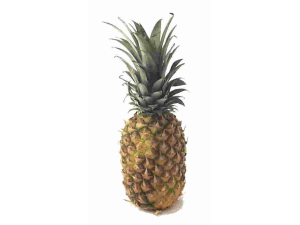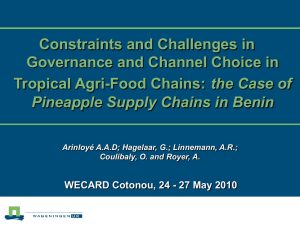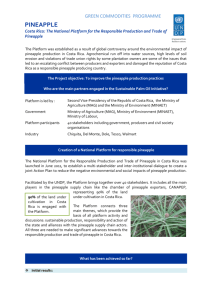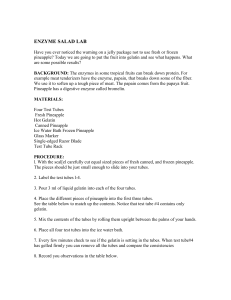Proposal for development of Pineapple Research Station
advertisement
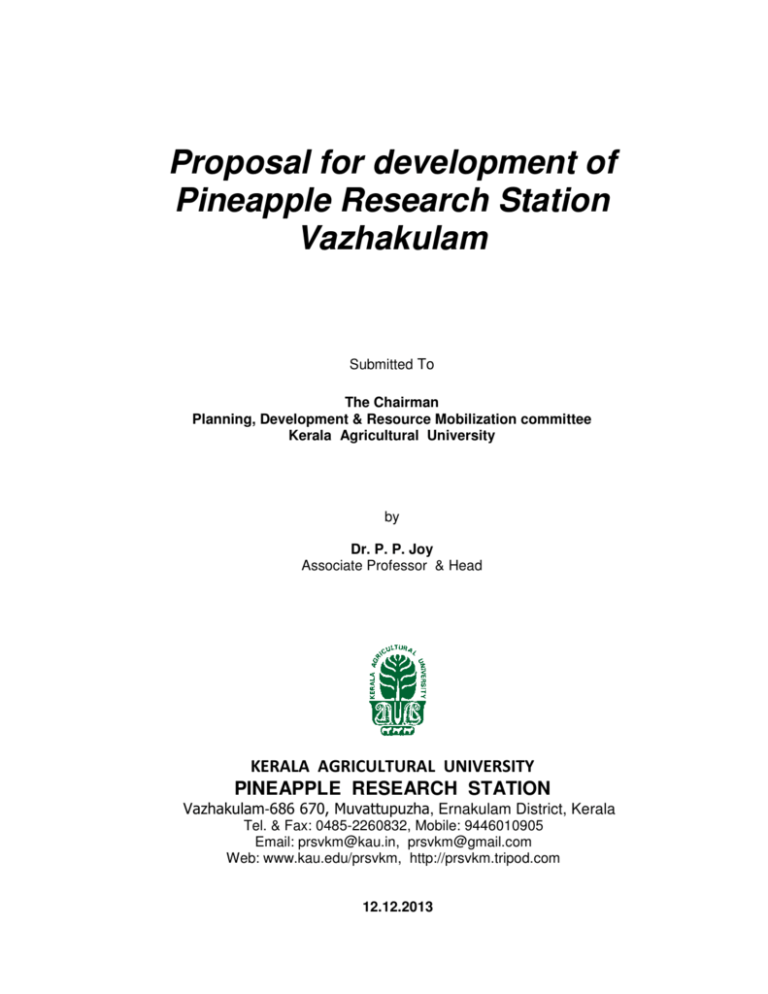
Proposal for development of Pineapple Research Station Vazhakulam Submitted To The Chairman Planning, Development & Resource Mobilization committee Kerala Agricultural University by Dr. P. P. Joy Associate Professor & Head KERALA AGRICULTURAL UNIVERSITY PINEAPPLE RESEARCH STATION - , Ernakulam District, Kerala Tel. & Fax: 0485-2260832, Mobile: 9446010905 Email: prsvkm@kau.in, prsvkm@gmail.com Web: www.kau.edu/prsvkm, http://prsvkm.tripod.com 12.12.2013 2 CONTENTS Page Preface Introduction Global scenario National scenario State scenario Kerala advantage Vazhakulam pineapple Opportunities Challenges Tasks ahead Pineapple Research Station Activities and Outcome Research Extension Technologies Internet Presence Planting material production Urgent Felt-Needs Permanent farm Staff Processing lab Training unit Publications Sales counter Vehicle Office renovation Fund release Career Advancement Development Proposal Tropical Fruit Crops Research Station Phase I Phase II Phase III Phase IV 3 4 4 4 6 7 7 8 8 9 9 11 11 11 12 12 12 13 13 13 14 14 14 15 15 15 15 15 16 17 18 18 19 20 Pineapple Research Station (Kerala Agricultural University), Vazhakulam-686 670, Muvattupuzha, Ernakulam, Kerala, India. Tel. & Fax: 0485-2260832, Mob: 9446010905, Email: prsvkm@kau.in, prsvkm@gmail.com, Web: www.kau.edu/prsvkm 3 Preface The Pineapple Research Station at Vazhakulam was established on 2nd January 1995 to give research and development support to pineapple farmers. Since then, this research centre of the Kerala Agricultural University has been steadily growing and serving as a subvention to the pineapple growers of the state and the country as well. The centre had a humble beginning on 2.1.1995 as “Pineapple Research Station & Pest and disease Surveillance Unit” under Kerala Horticulture Development Programme (KHDP). For the construction of the office-cum-laboratory building of the station, 15 cents of land was transferred from the Revenue Department to Kerala Agricultural University on 24.6.1996. It was delinked from KHDP and became a constituent research centre of Kerala Agricultural University under central zone on 1.7.1997. The present building was occupied on 27.6.1998. Pineapple Research Station, Vazhakulam operates under great resource constraints in terms of human resources and infrastructure. The urgent felt needs of the station need to be tackled on a war-footing to attain the mandatory objectives of the station. The station aims at providing research and development support to the pineapple growers, rendering quality technology, products and services to the pineapple sector and undertaking basic and applied research in pineapple and other fruit crops of Kerala. The proposal depicts the status of pineapple, importance of Vazhakulam pineapple geographic indication, opportunities, challenges and development plan proposing a metamorphosis into Tropical Fruit Crops Research Station (TFCRS) in line with Our Motto: ‘Quality People & Infrastructure for Quality Technology, Products & Services’. The station has both field experiments and tissue culture production of planting materials of pineapple, passion fruit and banana. The station is managed by a single scientist and a single office assistant as university staff. The research projects of this station are undertaken in 0.6 ha of leased farm of NAPF, Nadukara. It is 5 km away and creates problems in management and truthful conduct of the experiments. The lease expires on 30.09.2017. Therefore, a permanent farm with adequate fencing and security is an urgent felt need of the station. Pineapple Research Station Vazhakulam visualizes to be Tropical Fruit Crops Research Station (TFCRS) in the near future. The advanced research centre of excellence dreams to be the ultimate authority and provider of excellent quality technology, products and services in fruit crops through concerted research and development efforts sustained by best human resources and infrastructure development. Though Vazhakulam and neighbouring areas are well-known for fruit crops like pineapple, banana, mango, jack, papaya, passion fruit, rambutan, mangosteen, etc, there is no research station in the district catering to the needs of these farmers. Lack of own farm and adequate area is the basic hurdle for the development of the station. Free land is available in the nearby Muvattupuzha village in Avoly Panchayat under survey Nos. 71/2 (4.355 Acre), 72/3 (1.235 Acre) and 73/1A (2.265 Acre). Action is being taken for acquiring the land for the station, to have a permanent farm for raising various fruit plants, conserving germplasm and conducting field research, besides establishing adequate infrastructure for further development and diversification. If adequate area and infrastructure are available research and development efforts can be greatly strengthened. Acquisition of nearby free government land for the station as proposed and development of adequate infrastructure will go a long way in the agricultural development of the district and socioeconomic upliftment beside generating rural employment especially for the unemployed youths and ensuring livelihood and fruit security of the people. Pineapple Research Station (Kerala Agricultural University), Vazhakulam-686 670, Muvattupuzha, Ernakulam, Kerala, India. Tel. & Fax: 0485-2260832, Mob: 9446010905, Email: prsvkm@kau.in, prsvkm@gmail.com, Web: www.kau.edu/prsvkm 4 Proposal for development of Pineapple Research Station, Vazhakulam Introduction Pineapple (Ananus comosus, Bromeliaceae) is a wonderful tropical fruit having exceptional juiciness, vibrant tropical flavour and immense health benefits. Pineapple contains considerable calcium, potassium, fibre, and vitamin C. It is low in fat and cholesterol. Vitamin C is the body's primary water soluble antioxidant, against free radicals that attack and damage normal cells. It is also a good source of vitamin B1, vitamin B6, copper and dietary fibre. Pineapple is a digestive aid and a natural Anti-Inflammatory fruit. A group of sulfur-containing proteolytic (protein digesting) enzymes (bromelain) in pineapple aid digestion. Fresh pineapples are rich in bromelain used for tendering meat. Bromelain has demonstrated significant antiinflammatory effects, reducing swelling in inflammatory conditions such as acute sinusitis, sore throat, arthritis and gout and speeding recovery from injuries and surgery. Pineapple enzymes have been used with success to treat rheumatoid arthritis and to speed tissue repair as a result of injuries, diabetic ulcers and general surgery. Pineapple reduces blood clotting and helps remove plaque from arterial walls. Studies suggest that pineapple enzymes may improve circulation in those with narrowed arteries, such as angina sufferers. Pineapples are used to help cure bronquitis and throat infections. It is efficient in the treatment of arterioscleroses and anaemia. Pineapple is an excellent cerebral toner; it combats loss of memory, sadness and melancholy. Pineapple fruits are primarily used in three segments, namely, fresh fruit, canning and juice concentrate with characteristic requirements of size, shape, colour, aroma and flavour. More over there is great scope for the extraction of strong white fine silky fibre from pineapple leaves and its industrial utilization. Global scenario Pineapple exhibits increasing demand world wide, over the years. The global trade is around 50% as fresh fruit, 30% as canned product and 20% as juice concentrate. World trade on fresh pineapple has shown 100 % increase during the last one decade. Even though India is the sixth largest producer of pineapple in the world with a share of about 8% in production, its share in the world market is negligible. The main pineapple producers are Brazil, Thailand, Philippines, Costa Rica, China, India and Indonesia. The different Asian countries and the countries around the Indian ocean are importing about two lakh tonnes of pineapple in a year, mostly coming from distant countries. The leading exporters are Costa Rica, Belgium, Cote d’lvoire, Philippines, Ghana, Netherlands, USA and France. Major importers are USA, Belgium, France, Italy, Germany, Japan and UK. MD2 or Dinar pineapple developed through hybridisation by Del Monte scientists in Costa Rica is the most popular variety in the international market because of its colour, flavour, shape, life span and ripeness being superior to other varieties. National scenario India ranked sixth with a share of about 8 % of the world production of pineapples. The total area under pineapple cultivation in India is 89000 hectares with a production of about 1415000 t and productivity 15.9 t/ha during 2010-11. India exports pineapple mainly to Nepal, Maldives, United Arab Emirates, Saudi Arabia, Kazakhstan, Oman, Bahrain, Bangladesh, Zambia, Pakistan and Qatar. ‘Kew’ and ‘Mauritius’ are the two varieties of pineapple grown in India. It is grown in Karnataka, Meghalaya, West Bengal, Kerala, Assam, Manipur, Tripura, Arunachal Pradesh, Mizoram, and Nagaland. It is also cultivated on limited areas in the coastal belt of Tamil Nadu, Goa and Orissa. Though Assam has the largest area under pineapple West Pineapple Research Station (Kerala Agricultural University), Vazhakulam-686 670, Muvattupuzha, Ernakulam, Kerala, India. Tel. & Fax: 0485-2260832, Mob: 9446010905, Email: prsvkm@kau.in, prsvkm@gmail.com, Web: www.kau.edu/prsvkm 5 Bengal is the largest producer. Karnataka, West Bengal and Bihar are the three states reporting high productivity. Overall, Indian productivity of 15.9 t/ha poorly compares with the world average of 22.58 t/ha. ! " # ! " # $" ! & " # $ %& $"% ' '( ) & ( (%*"( ) $ $* +$ $ $,$ - & . $ ) /$ $ & /$ $ $ + $$ 0$ $ $ # $ /$ 1 $# / $ 2 . $ 3 $* . -$* 0$# #$*$ $ # 0 4$ " $ # 2/ 0 . #$ # +," , ) # # 2 / 6 . ) -. +0$ ,-, $ 5 ! - ) $ # %& " # $ %& ' '67 , ,-+ $4/$ 8 $ -) #9 - .- - 0 Pineapple Research Station (Kerala Agricultural University), Vazhakulam-686 670, Muvattupuzha, Ernakulam, Kerala, India. Tel. & Fax: 0485-2260832, Mob: 9446010905, Email: prsvkm@kau.in, prsvkm@gmail.com, Web: www.kau.edu/prsvkm - 6 & '( ) & ( ) ( $" ) . . ) $ # %& " # $ %& ' + + , , ) ) $ $* +$ $ $,$ - & $ ) /$ $ & /$ $ $ + $$ 0$ $ $ # $ /$ 1 $# / $ . 2# /$ 3 $* -$* 0$# . . #$*$ $ # 0 4$ " $ # 2/ 0 . " #$ # # # 2 / 0$ $ 5 6 ! & & ' 6 %& ' 7 , ( $ #9 0 '( ) & $4/$ 8 $"% ) . . + + , , ) ) ( ) $ $* +$ $ $,$ - & $ ) /$ $ & /$ $ $ + $$ 0$ $ $ # $ /$ 1 $# / -$* 0$# 2/ 0 . . . -) " .-, # # . .-, 2/ .-, .-) 0$ .-) $ 5 ,-) ,-. +) $ # %& ,'6 ,-, ),! " # $ %& ' State scenario In Kerala, total area under pineapple cultivation is 10200 hectares with a production of about 85500 t and productivity 8.4 t/ha during 2010-11. The congenial humid climate has favoured the cultivation of pineapple. The finest quality ‘Mauritius Pineapple’ comes from Kerala. The produce of Kerala is very much in demand as a fresh fruit throughout India and also in foreign countries because it is considered the best in quality, sweetness and has good flavour. Although pineapple cultivation is practised in almost all districts, the extent and trend of cultivation differs widely among Kerala’s districts. The major pineapple producing district of Pineapple Research Station (Kerala Agricultural University), Vazhakulam-686 670, Muvattupuzha, Ernakulam, Kerala, India. Tel. & Fax: 0485-2260832, Mob: 9446010905, Email: prsvkm@kau.in, prsvkm@gmail.com, Web: www.kau.edu/prsvkm ,- 7 Kerala, Ernakulam accounts for more than 60% of the area under pineapple cultivation. In Ernakulam district pineapple cultivation is more concentrated in certain areas of Vazhakkulam. Ernakulam district was ranked first having a share of over 60% of the total production. In Kerala, pineapple is grown mainly as an intercrop in rubber and coconut, and also as pure crop in garden land and in converted paddy fields. Pineapple fruits are produced round the year. There is immense potential to increase the area under pineapple in Kerala as it can be grown as an intercrop in coconut and rubber plantations. Coconut is grown in about 8 lakh hectares and if pineapple is grown as an intercrop in coconut garden it will give an additional income, especially in root wilt affected areas it will be a solace to the farmers. Special attention can be given for intercropping pineapple in coconut in root wilt affected areas. Out of the 5 lakh hectares of rubber grown, about 15000 hectare is replanted every year. Pineapple is grown as intercrop for the first three years in rubber at the time of replanting. Pineapple cultivation in rubber will give income to farmers during the period when there is no income from rubber. However, only less than two percent of the potential area in Kerala is cultivated with pineapple. Kerala advantage Kerala has exclusive advantage in producing Mauritius variety, which is highly suitable for export market. The pineapple growers to a large extent are now adopting the modern cultivation practices like high-density planting, hormone application for uniformity in flowering and other management practices. The pineapple fruits are consumed as fresh fruit or made into products like jam, squash, candy etc., for value addition. The variety proposed for cultivation is Mauritius since huge internal market as well as export potential is available. Its advantages include longer shelf life, sweetness and can be consumed as fresh fruits. Sea shipment protocol for export of pineapple has been developed. Supply chain for pineapple from Kerala is identified to be the most competitive for the domestic market due to the varietal advantage as there is price difference in the range of 1-2 Rs./kg between Mauritius and Kew in favour of Mauritius. Consumer preference for Mauritius is huge due to the fact that it is most suitable for table purpose and Giant Kew and Queen are best suitable for processing. Kerala Agricultural University has released a new hybrid pineapple Amritha. It is a hybrid between Kew and Ripley queen. It has spiny leaves and 13-15 months duration. Fruit is cylindrical, tapering slightly from near base, weighing 1.5-2.0kg. Crown is small weighing 80-100g; ratio of fruit weight to plant weight is medium. Fruit is green when unripe and uniformly yellow when ripe; fissure and eye corking absent, spirals are left oriented. Fruit is firm with mild external aroma, skin 6 mm thick, flesh firm, non-fibrous, crisp and pale yellow in colour with rich aroma. Taste is good with high total soluble salts and low acidity. Vazhakulam pineapple Pineapple has been commercially grown in Vazhakulam area for more than 50 years for its excellent fruit for fresh consumption. Vazhakulam area is ideally suited for the production of pineapple for table purpose. Planting is done in almost all the months, except during the heavy monsoon days. Hence, fruits are available round the year. Vazhakulam is considered as the biggest pineapple market in India from where the fruit is being transported to all the South Indian states and most of the North Indian states. It is grown in the districts of Ernakulam, Kottayam, Pathanamthitta and the low elevation areas of Idukki district in Kerala. It is the centre of pineapple trade in Kerala and India. Vazhakulam pineapple was Registered as Geographical Indication (GI) No. 130 under Agricultural-Horticultural product at the GI Registry, Chennai on 4th September 2009. GI registration is the process of endorsing brand protection under WTO guidelines to the producers of any product known for quality and Pineapple Research Station (Kerala Agricultural University), Vazhakulam-686 670, Muvattupuzha, Ernakulam, Kerala, India. Tel. & Fax: 0485-2260832, Mob: 9446010905, Email: prsvkm@kau.in, prsvkm@gmail.com, Web: www.kau.edu/prsvkm 8 marketed in the label of a geographic area. The registered proprietors of the intellectual property attached to Vazhakulam Pineapple are Nadukkara Agro Processing Co. Ltd (NAPCL), Avoly P.O., Muvattupuzha-686677; The Kerala Agricultural University, Vellanikkara, KAU Post, Thrissur-680656 and Pineapple Farmers’ Association Vazhakulam-686670, Muvattupuzha, Kerala. Vazhakulam pineapple locally known as ‘Kannara’ is a Mauritius variety coming under the species Ananas comosus. The plant is about 85-90 cm height, leaves spiny, gives yield within 12-13 months. The average fruit weight is 1.2-1.4kg. The fruit has a pleasant aroma, slightly conical in shape, fruit ‘eyes’ deeply placed, fruit flesh is crisp and golden yellow in colour, juice is sweet with 14-16° brix and its acidity is 0.50 - 0.70%. The fruit withstands post harvest handling damages and long distance transport. Vazhakulam pineapple is unique in aroma, flavour and sweetness due to its high sugar content and low acidity. The GI registration has boosted the export of pineapple from the state considerably, besides the high reputation fetching premium price in the international market. Opportunities The state offers great opportunities for expanding the cultivation of pineapple. Important among them are listed below. • • • • • • • • • • • • • Some districts are traditional growers of pineapple such as Mauritius and Kew Well established and organized Pineapple Farmers’ Association Research and development support from Kerala Agricultural University Industry support especially from NAPCL Markets at Vazhakulam and nearby areas and VFPCK markets in all districts available GI registration of Vazhakulam pineapple has boosted the export from the state considerably Farmers have locally available planting material Farmers have knowledge of pineapple cultivation Farmers are increasingly following commercial cultivation The traders in the market are generally vibrant and relatively organised Farmers and promoters are interested in pursuing sustainable agriculture, which reduces costs and increases farmers skills to manage food security concerns The opportunity for niche organic market exists The production within all the potential areas can be increased. Challenges Expanding area under cultivation and increasing productivity are very challenging. Major challenges are listed below. • • • • • • • Identification of specific varieties for fresh fruit, canning and juice segments suitable for cultivation ensuring sustained economic return. Provision of improved technology and production inputs for each segment. Post harvest management & value addition Storage and marketing support. Crop specific training support to the stakeholders Exploration of new fields viz .high-density planting, tissue culture, organic farming, vermi-composting, etc. Staggering of pineapple production through chemical induction and round the year production, peak synchronizing with summer season when demand is highest. Pineapple Research Station (Kerala Agricultural University), Vazhakulam-686 670, Muvattupuzha, Ernakulam, Kerala, India. Tel. & Fax: 0485-2260832, Mob: 9446010905, Email: prsvkm@kau.in, prsvkm@gmail.com, Web: www.kau.edu/prsvkm 9 • • • • • Labour resource mobilization especially through NREGS to promote agriculture and food security in rural areas. Issues of mosquito-borne infectious diseases as Leptospirosis, Malaria, Dengue, Chikun gunya, etc Climate and market uncertainties causing farmers’ suicides. Risk of ecological/environmental degradation Problems of bio- waste management Tasks ahead The important tasks before us are the following • • • • • • • Sustaining past achievements and moving ahead with tempo Resource mobilization, especially labour Market strengthening and support price fixation and creating storage facilities Extending loan facilities for cultivation on leased lands Strengthening existing processing units and starting new ones Control of emerging infections and lifestyle diseases Affordable and accessible and quality health care to all Pineapple Research Station (PRS) The Pineapple Research Station at Vazhakulam was established on 2nd January 1995 to give research and development support to pineapple farmers. Since then, this research centre of the Kerala Agricultural University has been steadily growing and serving as a subvention to the pineapple growers of the state and the country as well. The research centre strives to become the ultimate authority and provider of excellent quality technology, products and services in the pineapple sector through concerted research and development efforts sustained by best human resource and infrastructure development. The centre had a humble beginning on 2.1.1995 as “Pineapple Research Station & Pest and disease Surveillance Unit” under Kerala Horticulture Development Programme (KHDP). For the construction of the office-cum-laboratory building of the station, 15 cents of land was transferred from the Revenue Department to Kerala Agricultural University on 24.6.1996. It was delinked from KHDP and became a constituent research centre of Kerala Agricultural University under central zone on 1.7.1997. The present building was occupied on 27.6.1998. The centre is located close to the pineapple market at Vazhakulam, 10 km east of Muvattupuzha on the Muvattupuzha - Thodupuzha road in Ernakulam District, Kerala. It is about 40 km from Cochin International Air port, Nedumbassery; 50 km from Aluva railway station and 80 km from the Cochin harbour. The mandate of the research centre is to give research and development support to the pineapple growers, provide quality technology, products and services to the pineapple sector and undertake basic and applied research in pineapple and other fruit crops of Kerala. The station has taken up research in pineapple on various aspects like intercropping in rubber and coconut, plant spacing and density, organic and chemical fertilizer requirement etc. besides experiments on development of new varieties. Based on continuous surveillance and laboratory studies the station has identified the presence of PMWA virus in pineapple in Vazhakulam area. Based on all the findings this station has formulated the Package of Practices Recommendations for the popular variety Mauritius and included in the POP and all the technology developed are being Pineapple Research Station (Kerala Agricultural University), Vazhakulam-686 670, Muvattupuzha, Ernakulam, Kerala, India. Tel. & Fax: 0485-2260832, Mob: 9446010905, Email: prsvkm@kau.in, prsvkm@gmail.com, Web: www.kau.edu/prsvkm 10 delivered to the pineapple growers extensively. Vazhakulam pineapple has been registered in the Geographical Indication Registry to boost the export of pineapple. The centre has established good laboratory facilities. The Plant Tissue culture, biochemistry and pathology labs are equipped with Gel documentation, ELISA Reader and washer, PCR, Colourimeter, UV- Transilluminator, Flame photometer, Centrifuge, Microscopes, Electrophoresis, Shakers, ovens, Precision Weighing balances, Deep freezer, BOD, Laminar Air Flow, still, etc. It has a leased farm of two hectares at NAPCL. The library has adequate specialised books and periodicals relevant to the sector. It has a sales counter for the public sale of Tissue Culture Plants, Seedlings, Rooted cuttings, Publications, etc. The centre undertakes basic and applied research and development activities in pineapple and other fruit crops of Kerala. The research and development projects are mainly in Participatory technology development (PTD) mode and funded by various agencies as KAU, State and central governments, ICAR, SHM, NHM, etc. The centre has developed scientific technology for the commercial cultivation of Kew and Mauritius varieties of pineapple, including pure cropping, intercropping in rubber and coconut plantations and in reclaimed paddy lands. Technology is developed for organic production. Tissue culture protocols for various varieties of pineapple are available. GI indication of Vazhakulam Pineapple is registered. Performance evaluation of MD2 pineapple is in progress at the centre. Participatory technology process and product development in association with sister institutions, Nadukkara Agro Processing Co.Ltd. and Pineapple Farmers' Association for the stakeholders is a steady and continuing process at the centre. Technology transfer is effectively carried out through personal discussions, field visits, phones, emails, website, posts, radio, TVs, news papers, periodicals, publications, pineapple fests, seminars. trainings, etc. The centre produces and sells Tissue Culture Plants, Seedlings, Rooted cuttings and Publications and renders services such as Agriclinic & advisory, Training, Consultancy, Quality testing and Project work of P.G. students. The centre is looking ahead enthusiastically with pioneering research and development actions in the sector owing to many reasons. The pineapple cultivation in Kerala is dependent on fresh fruit market, supplying most of its produce to outside Kerala. The Mauritius variety grown in Kerala is marketed in about 10 states in India including Delhi. It is also exported to Gulf countries in limited quantities. It is possible to increase its marketing by exploring new markets and techniques and also by increase in quality and quantity of fruit produced. It is essential to explore the possibility for marine exports to reduce cost. Consumer preference and marketing strategies need to be taken into consideration. There is immense potential to increase the area under pineapple in Kerala as it can be grown as intercrop in coconut and rubber plantations. However, only less than two percent of the potential area in Kerala is cultivated with pineapple. At present pineapple cultivation in Kerala is generating employment of about 45 lakh mandays among farmers, agricultural workers, people involved in loading, unloading, transporting, traders, retailers etc. By doubling the area under pineapple cultivation, an additional 45 lakhs work days per year can be created. Besides pineapple, since Vazhakulam and neighbouring areas are well-known for other fruit crops like banana, mango, jack, papaya, rambutan, mangosteen, etc, Pineapple Research Station, Vazhakulam visualizes to be Tropical Fruit Crops Research Station (TFCRS) in the immediate future. The advanced research centre of excellence dreams to be the ultimate authority and provider of excellent quality technology, products and services in fruit crops through concerted research and development efforts sustained by best human resources and infrastructure development. Pineapple Research Station (Kerala Agricultural University), Vazhakulam-686 670, Muvattupuzha, Ernakulam, Kerala, India. Tel. & Fax: 0485-2260832, Mob: 9446010905, Email: prsvkm@kau.in, prsvkm@gmail.com, Web: www.kau.edu/prsvkm 11 Activities and Outcome Research The following outcome of research and development activities are reported at this station. By taking up various research projects, standardization of the management of pineapple in coconut and rubber, effect of various organic manures in pineapple, effect of various levels of NPK in pineapple etc were done. Under an ICAR adhoc scheme, more than 3000 pineapple hybrids were evaluated in detail and several promising hybrids were identified. These hybrids are under multiplication and evaluation. One project financed by IPL and Kali Salz (Germany), aimed to study the effect of two sources of potassium, MOP and SOP, on yield and quality of pineapple were undertaken. Another project on passionfruit aims to develop a variety suitable for low altitude areas. One project aims to catalogue the various pests and diseases of pineapple and formulate control measures. Under this project presence of virus disease in pineapple at Vazhakulam area was detected. The salient results based on the above projects of the station are as follow 1) Formulated package of practices recommendations for the Mauritius variety of pineapple. 2) Developed a pineapple variety suitable for processing industry which is better than the present Kew variety and is in the farm trial stage. 3) Developed a pineapple variety suitable for fresh fruit market which is better than the present Mauritius variety and is in the farm trial stage. 4) Developed a passionfruit variety suitable for fresh fruit and processing and is in the farm trial stage. Extension This station is giving Farm Advisory Service to pineapple growers throughout Kerala and also outside Kerala ever since its inception either by visiting the plot, telephone, letter or by the visit of the farmer to the station, as per the situation warrants. This station participates regularly in seminars, radio talks, TV programmes etc. The shareholders (pineapple farmers) of Nadukkara Agro Processing Company were given training in pineapple cultivation. Pineapple farmers under the Agri Export Zone in various districts were given training on pineapple management. Trainings were also given to Agricultural Officers and farmers in association with Dept. of Agriculture. It is associating with the Pineapple Farmers Association at Vazhakulam in all its activities related to the promotion of pineapple cultivation, from 1995 onwards. c) Income generating activities This station did not have any land for any income generation from land. Hence the chance for any income is from the technology developed and from the laboratory services. The activities of the station are in this direction and this is a slow process. The efforts so far done had started showing results. The station has started selling the planting material of the new passionfruit variety under development. Also the marketing of the technology developed for Mauritius variety as consultancy services has also been initiated. d) Suggestions for increasing internal revenue Pineapple Research Station (Kerala Agricultural University), Vazhakulam-686 670, Muvattupuzha, Ernakulam, Kerala, India. Tel. & Fax: 0485-2260832, Mob: 9446010905, Email: prsvkm@kau.in, prsvkm@gmail.com, Web: www.kau.edu/prsvkm 12 i) Sale of planting material of the varieties under development ii) Consultancy services iii) Commercialization of Tissue culture lab e) Suggestions for generation of internal receipt i) Providing project work facility to P.G. students of other Universities charging fees. Technologies available at PRS, Vazhakulam The following technologies are available for consultancy service/transfer. Pineapple 1. Situation specific recommendation for management of pineapple (precision farming). Technology for cultivation of pineapple as pure crop and as intercrop in coconut, rubber and cashew is available. Recommendations under different soil and climatic conditions like reclaimed low lands, nutrient management etc are available. 2. Quality analysis of fruit. For export of pineapple, quality analysis may be helpful. 3. Identification of disease and pest of pineapple. Apart from pests and fungal diseases, identification of virus disease in pineapple by ELISA test is done. (Molecular diagnosis of virus disease is under trial now and it will be available shortly). 4. Protocol for tissue culture propagation of pineapple. Passionfruit 1. Management techniques of passionfruit. 2. Quality analysis of passionfruit. 3. Small scale production of passionfruit syrup. Banana 1. Protocol for tissue culture propagation of Nendran, poovan, njalipoovan, red banana, robesta and grandnaine varieties of banana Internet Presence Pineapple Research Station launched its own website as a subsite under the Kerala Agricultural University main site in June 2010. Please visit our websites http://www.kau.edu/prsvkm and http://prsvkm.tripod.com to know more about Pineapple Research Station and its R & D goals and activities. Our esteemed readers may please point out the errors and omissions, if any and mail to prsvkm@gmail.com for correction at the earliest. Critical suggestions for improvement, additional relevant information, other useful links, etc are invited. We are most obliged for any constructive comments, suggestions and criticisms mailed to prsvkm@gmail.com. Planting material production and sale 25000 TC MD-2 sold to NAPCL, Nadukkara 2500 TC Nanas sold to Mr. Rex Paikada 70000 TC pineapple total sold (2008-) 35000 Passion fruit seedlings sold (2004-) 150 Passion fruit rooted cuttings sold (2010-) 10000 TC Banana sold (2010-) Pineapple Research Station (Kerala Agricultural University), Vazhakulam-686 670, Muvattupuzha, Ernakulam, Kerala, India. Tel. & Fax: 0485-2260832, Mob: 9446010905, Email: prsvkm@kau.in, prsvkm@gmail.com, Web: www.kau.edu/prsvkm 13 Urgent Felt-Needs of the Station Pineapple Research Station, Vazhakulam operates under great resource constraints in terms of human resources and infrastructure. The following are the urgent felt needs of the station to attain the mandatory objectives of the station. The station aims at providing research and development support to the pineapple growers rendering quality technology, products and services to the pineapple sector and undertaking basic and applied research in pineapple and other fruit crops of Kerala. Permanent farm The research projects of this station are undertaken in the leased farm of NAPCL, Nadukara. It is 5 km away which creates problems in management and truthful conduct of the experiments. Experiment results are realistic and valid only when they are conducted properly as per scientific protocols. The growth, yield and quality attributes are regularly observed, recorded, analysed and interpreted to arrive at logical conclusions. Within the resource constraints of KAU, we take great pains to layout experiments, impose treatments and record observations according to scientific protocols for ensuring the reliability of research results. All our efforts are in vain if the yield estimates are not correct. We have observed that when the fruits of pineapple and passion fruit ripen, many of them go missing from the leased farm of NAPCL, Nadukara. As a result, we are unable to record the correct yield leading to erroneous results. Under the circumstances, a permanent farm at walkable distance with adequate fencing and security is an urgent felt need of the station. Staff Farm Officer Scientific staff (Horticulture, Plant breeding, plant pathology) Research Associates (Biotechnology, Microbiology and Biochemistry) The station is managed by a single scientist and a single office assistant as university staff. The various projects are executed by engaging skilled assistants and labourers on daily wage contract basis. Management of the research projects by daily wage contract people is highly difficult and many times the reliability of the data is questionable due to lack of continuity, commitment and integrity. The station has both field experiments and tissue culture production of planting materials of pineapple, passion fruit and banana. The farm, 5km away from the station, needs the full time service of a Farm Officer for effective implementation of various field experiments. Experiment results are realistic and valid only when they are conducted properly as per scientific protocols. Quality evaluation of the experimental samples is a continuous activity at the station requiring the service of a full time biochemist. The tissue culture laboratory needs full time attention of a biotechnologist continuously. The service of a plant breeder/ horticulturist is highly essential for the purpose. Microbial contamination is the greatest problem hindering large scale production of tissue culture plants in tissue culture lab. This can be tackled only by availing the service of a microbiologist/plant pathologist. Under the circumstances, necessary action may be taken for providing the required scientific staff in Horticulture, Plant breeding, plant pathology. Until KAU staff is provided, sanction may be granted for creating temporary posts of research associates of Farm Officer, Biochemist, Biotechnologist, and Microbiologist and necessary action may be taken for appointing them at the earliest. Pineapple Research Station (Kerala Agricultural University), Vazhakulam-686 670, Muvattupuzha, Ernakulam, Kerala, India. Tel. & Fax: 0485-2260832, Mob: 9446010905, Email: prsvkm@kau.in, prsvkm@gmail.com, Web: www.kau.edu/prsvkm 14 Processing lab Internal revenue generation is a matter of concern for Kerala Agricultural University. The pineapple and passion fruits of different accessions obtained from various experiments at PRS, Vazhakulam are taken for quality analyses on a regular basis. Since a mixture of types is involved and destructive sampling is essential for the purpose, the remaining part of the fruits is not marketable and hence cannot be sold in the market. Though the leftover fruits are not marketable they can be beneficially converted to value added products like squash, jam, syrup, etc if a small scale processing unit with FPO Registration is established at PRS, Vazhakulam. If small home scale fruit processing units are started in the hot spots of pineapple production, the market fluctuation can be reduced and substantial employment generation is effected especially for the rural youth and women. Establishment of a fruit processing laboratory at PRS, Vazhakulam for the efficient conversion of leftover fruits to value added products like squash, jam, syrup, etc will also cater to function as a demonstration and training unit for the various self-help groups in the state, besides fetching additional revenue for the station. The existing building has to be renovated with floor and wall tiles, conforming to the guidelines for FPO Registration. Doors, windows and exhausts have to be secured with wire nets to make the unit insect proof. Essential equipment, furniture, storage cans, bottles utensils, tools, raw materials, etc have to be procured for various activities such as juice extraction, pulp production, heating, sterilisation and preparation of squash, jam, syrup, etc. FPO Registration has to be obtained for marketing of the finished products. A vehicle is also required for transportation of raw materials from farm and finished products. A project proposal to establish a fruit processing laboratory at PRS, Vazhakulam for the efficient conversion of leftover fruits to value added products like squash, jam, syrup, etc at a total cost of Rs.19.90 lakh was submitted for approval under RKVY 2011-12. The project may be approved for implementation at the earliest. Training unit Pineapple Research Station has no training facilities presently. The scientific technology on cultivation and utilization of the mandatory crops can be easily disseminated to the target groups through training, demonstrations, interactions, seminars etc. Lot of awareness is needed for the growers about the importance of scientific cultivation and post harvest management especially with regards to the right stage of harvesting, post harvest treatments to enhance shelf life of fresh as well as semi processed products of pineapple and passion fruit. Proper trainings need to be given to the extension functionaries, the growers, handlers and processors and facilities for various post harvest treatments need to be established. Proper and timely transfer of technology and participatory technology development would certainly boost the pineapple and passion fruit production and industrial utilization in the state, besides generating employment and empowering rural youth, especially women. A training hall with LCD projection facilities and adequate seating arrangements is an absolute necessity of the station. Publications The farmers visiting the station always ask for publications on the relevant technology generated at the station. The technology can be easily disseminated through various publications such as leaflets, palmlets, books, CDs, DVDs, etc covering various aspects of cultivation and utilization of the mandatory crops of the station. Adequate budgetary provision is required for undertaking various works associated with the production of these publications. Pineapple Research Station (Kerala Agricultural University), Vazhakulam-686 670, Muvattupuzha, Ernakulam, Kerala, India. Tel. & Fax: 0485-2260832, Mob: 9446010905, Email: prsvkm@kau.in, prsvkm@gmail.com, Web: www.kau.edu/prsvkm 15 Sales counter A sales counter facing the public road is essential for the public sale of Tissue Culture Plants, Seedlings, Rooted cuttings, Publications, etc with adequate facilities for displaying all these items appropriately and attractively. The mass produced tissue culture plants of pineapple, banana and passion fruit should be sold out/lifted from the station for further augmenting tissue culture production. Vehicle The experiments under the different plan and externally aided projects are undertaken in the leased farm of NAPCL, Nadukkara located 5 km away from the station. The management of the farm, labourers, inputs and farm produce is highly difficult and inefficient without a vehicle. Since PRS is not having a vehicle of its own, frequent visits to the farm is not practically possible and the monitoring of the farm is not efficient. Labour turnover is also not satisfactory. The matter has been conveyed to KAU and a vehicle has been requested for repeatedly. The farm is managed by engaging skilled assistants and labourers on daily wage contract basis, who are all ladies due to socio-economic factors of the locality. A two wheeler (Honda Activa, Hero Honda Pleasure or TVS Scooty) which can be easily managed by ladies is absolutely essential for the daily management of the farm. A four wheeler (Mahindra Bolero) is also required for transporting various farm inputs and farm produce. It is also essential for disposing off the planting materials produced at the station. The station has very limited stocking facilities. Office renovation Pineapple Research Station, Vazhakulam was started in 1995 and shifted to the present building in 1998. Since then, no repair works have been undertaken on the building. Office building is in a very dilapidated situation. The earthen tiles fixed on the top of the sunshade were detached and many of them got damaged. During rainy season, leakage has been observed at various points and walls, both inside and outside, become wet. This may lead to short circuits and other electrical problems. The painting has already been disfigured by fungal growths and other bodies. This is the main cause of contamination in the plant tissue culture lab. The building has a very ugly look at present. The office building has to be renovated and painted urgently. Necessary budget provision may be sanctioned for the repair, renovation, painting and modernization of the office building. Fund release Though adequate budgetary provision is made timely release of fund is not happening which hinders prompt implementation of various research and development activities of the station. The pay arrears have not been paid. Even the salary is not paid timely. At times, the mandatory payments of electricity charges, telephone charges, LIC etc which attracts fines, penalties and disconnections due to late payments could not be made in time due to lack of adequate funds released from KAU in time. Release of funds at the fag end of the financial year will lead to hasty implementation of projects without proper planning, commitment, validation and utility. Hence, it is requested to release the various funds provided in the budget in time systematically for the best utilization of the funds. Career Advancement Lack of timely career advancement to the deserving ones is the root cause of deterioration of morale leading to poor research and development output. Pineapple Research Station (Kerala Agricultural University), Vazhakulam-686 670, Muvattupuzha, Ernakulam, Kerala, India. Tel. & Fax: 0485-2260832, Mob: 9446010905, Email: prsvkm@kau.in, prsvkm@gmail.com, Web: www.kau.edu/prsvkm 16 Development proposal Presently four plan projects are operational at PRS, Vazhakulam. An externally aided project on ‘Evaluation of passion fruit types for commercial cultivation in Kerala’ at a total cost of Rs.12.55 lakh for 3 years is sanctioned by Kerala State Council for Science, Technology and Environment. Another project proposal to establish a fruit processing laboratory at PRS, Vazhakulam for the efficient conversion of leftover fruits to value added products like squash, jam, syrup, etc at a total cost of Rs.19.90 lakh was submitted for approval under RKVY 2011-12. The station has both field experiments and tissue culture production of planting materials of pineapple, passion fruit and banana. The station is managed by a single scientist and a single office assistant as university staff. The research projects of this station are undertaken in 1.2 ha of leased farm of NAPCL, Nadukara. It is 5 km away and creates problems in management and truthful conduct of the experiments. The lease expires on 30.09.2012. Therefore, a permanent farm with adequate fencing and security is an urgent felt need of the station. Lack of own farm and adequate area is the basic hurdle for the development of the station. Preliminary enquiries show that free land is available in the nearby Muvattupuzha village in Avoly Panchayat under survey Nos. 71/2 (4.355 Acre), 72/3 (1.235 Acre) and 73/1A (2.265 Acre). If action is taken for acquiring the land for the station, the station will have a permanent farm for raising various fruit plants, conserving germplasm and conducting field research, besides establishing adequate infrastructure for further development and diversification. If adequate area and infrastructure are available research and development efforts can be greatly strengthened in the following lines for the agricultural development of the district and socioeconomic upliftment and livelihood of the people. Identification of specific varieties for fresh fruit, canning and juice segments suitable for cultivation ensuring sustained economic return through research. Mass production of planting materials, especially through tissue culture Development of improved technology and production inputs for each segment. Development of on-farm post harvest management practices & value addition Extraction of fibre from pineapple leaves and its industrial utilization. Extraction of protein digesting enzyme bromelain for commercial use Strategic provision for storage and marketing support. Crop specific training support to all the stakeholders Exploration of new fields viz .high-density planting, tissue culture, organic farming, vermi-composting, etc. Staggering of pineapple production through chemical induction and round the year production, peak synchronizing with summer season in pace with demand. Diversification to the research and development of other fruit crops like banana, mango, jack, papaya, passion fruit, rambutan, mangosteen, etc Labour resource mobilization especially through NREGS to promote agriculture and food security in the area. Alleviation of climate and market uncertainties causing farmers’ suicides. Reducing the risk of ecological/environmental degradation Effective tackling of bio- waste management problems Earnest efforts are also being taken to acquire free government land nearby as a permanent farm for raising various fruit plants, conserving germplasm and conducting field research, besides establishing adequate infrastructure for further development and diversification, renaming the station as Tropical Fruit Crops Research Station (TFCRS). It is also Pineapple Research Station (Kerala Agricultural University), Vazhakulam-686 670, Muvattupuzha, Ernakulam, Kerala, India. Tel. & Fax: 0485-2260832, Mob: 9446010905, Email: prsvkm@kau.in, prsvkm@gmail.com, Web: www.kau.edu/prsvkm 17 proposed to establish a fruit processing laboratory with FPO registration at the centre for the efficient conversion of leftover fruits to value added products like squash, jam, syrup, etc. Besides pineapple, since Vazhakulam and neighboring areas are well-known for other fruit crops like banana, mango, jack, papaya, passion fruit, rambutan, mangosteen, etc, and there is no research station in the district catering to the needs of these farmers, Pineapple Research Station, Vazhakulam visualizes to be Tropical Fruit Crops Research Station (TFCRS) in the near future. This advanced research centre of excellence dreams to be the ultimate authority and provider of excellent quality technology, products and services in tropical fruit crops through concerted research and development efforts sustained by best human resource and infrastructure development in line with Our Motto ‘Quality People & Infrastructure for Quality Technology, Products & Services and Merit alone counts for Quality suitable for the purpose’. Tropical Fruit Crops Research Station (TFCRS) TECHNOLOGY Crop Improvement Agricultural Botany Plant Breeding Biotechnology Crop Production Agronomy Horticulture Agricultural Chemistry Agricultural Economics Crop Protection Agricultural Entomology Plant Pathology Microbiology Nematology PRODUCTS SERVICES Crop Processing & Product Development Food Processing Home Science Quality Assurance Quality Control Transfer of Technology Agricultural Extension, ICT Other Services Fig. 1. Prospective Structural Hierarchy of the Tropical Fruit Crops Research Station Pineapple Research Station (Kerala Agricultural University), Vazhakulam-686 670, Muvattupuzha, Ernakulam, Kerala, India. Tel. & Fax: 0485-2260832, Mob: 9446010905, Email: prsvkm@kau.in, prsvkm@gmail.com, Web: www.kau.edu/prsvkm 18 PRS envisages steady systematic metamorphosis into Tropical Fruit Crops Research Station (TFCRS) in phases as detailed below. Phase I Technology division • Development of improved varieties of pineapple and their cultivation practices • Standardization of protocols for micro propagation of pineapple, banana and passion fruit. • Pest and diseases monitoring. • Virus indexing. • Standardization of quality parameters of pineapple. Product division • Production of Pineapple squash, jam, syrup • Large scale production of tissue culture plants of pineapple and passion fruit and seedlings of passion fruit. • Publications and video CDs on tissue culture of pineapple and passion fruit. Services division • Providing quality evaluation reports • Agriclinic, advisory, training and consultancy. Human resources development • Agronomist • Biotechnologist • Plant breeder • Farm officer Infrastructure development • Establishment of processing lab • Library • Training complex Phase II Technology division • Development of improved varieties of passion fruit and their cultivation practices. • Standardization of protocols for micro propagation of banana. • Isolation and detection of microorganisms affecting pineapple, passion fruit and banana. • Pest and diseases control of pineapple and passion fruit. • Standardization of quality parameters of passion fruit. • Biotic stress tolerant pineapple varieties. Product division • Augmentation of tissue culture plants of pineapple, passion fruit and banana. • Pineapple and passion fruit squash, jam, syrup, candy, juice and blended items. • Publications and video CDs tissue culture of banana. Pineapple Research Station (Kerala Agricultural University), Vazhakulam-686 670, Muvattupuzha, Ernakulam, Kerala, India. Tel. & Fax: 0485-2260832, Mob: 9446010905, Email: prsvkm@kau.in, prsvkm@gmail.com, Web: www.kau.edu/prsvkm 19 Services division • Quality testing of pineapple, passion fruit and banana. • Project works of PG students. Human resources development • Horticulturist • Microbiologist • Agricultural chemist • Pathologist Infrastructure development • Information and sales centre. • Augmentation of microbiology and quality control lab. • Purchase of equipment like GC, AS, Micro gel unit. • Electron microscope • Colony counter. • Incubator • Particle bombardment system. • Vertical gel electrophoresis apparatus. Phase III Technology division • Development of improved varieties of banana and their cultivation practices. • Standardization of protocols for micro propagation for jack fruit and mango. • Development of molecular markers for pineapple, passion fruit, banana. • Abiotic stress tolerant passion fruit varieties Product division • Large scale production of tissue culture plants of pineapple, passion fruit, banana, jack fruit and mango. • Production of banana chips, candies. Services division • Custom based tissue culture production of fruit crops. Human resources development • Climatologist • Home scientist • Agricultural extension scientist • Entomologist Infrastructure development • Weather forecasting station. • Permanent farm of 5 hectares. • Virtual database information system. • Additional tissue culture lab • HPLC • 10 KVA UPS system. Pineapple Research Station (Kerala Agricultural University), Vazhakulam-686 670, Muvattupuzha, Ernakulam, Kerala, India. Tel. & Fax: 0485-2260832, Mob: 9446010905, Email: prsvkm@kau.in, prsvkm@gmail.com, Web: www.kau.edu/prsvkm 20 Phase IV Technology division • Development of improved varieties of other crops like sapota, rambutan etc. • Micro propagation of other fruit crops • Pest and disease control of sapota, mango, jack fruit, rambutan etc • Molecular markers for sapota, mango, jack fruit, rambutan etc Product division • Publication and video CDs tissue culture of sapota, mango, jack fruit, rambutan and all other fruit crops. Services division • Providing quality evaluation reports. • Custom based tissue culture production of fruit crops. Human resources development • Librarian • System manager Infrastructure development • Establishment of full fledged TFCRS block The proposal for development of Pineapple Research Station (PRS) into Tropical Fruit Crops Research Station (TFCRS) is submitted for favour of kind perusal, further necessary action and favourable orders at the earliest. Budget (Rs.) (for short term only) Sl.No. 1. 2. Item Manpower I year II year III year Total i. Farm Officer (10480-183000) 200000 210000 215000 625000 ii. Research Associates (3 Nos.) @ Rs. 18000/Month iii Labour (3 Men & 7 Women) Repair & Maintenance 650000 650000 650000 1950000 800000 300000 850000 400000 900000 400000 2550000 1100000 500000 500000 500000 1500000 15000 200000 2665000 17000 250000 2877000 20000 300000 2985000 52000 750000 8527000 3. Equipment 4. 5. TA Contingencies Total Rupees eighty five lakh twenty seven thousand only Place: Vazhakulam Date: 12.12.2013 Dr. P. P. Joy Associate Professor & Head Pineapple Research Station (Kerala Agricultural University), Vazhakulam-686 670, Muvattupuzha, Ernakulam, Kerala, India. Tel. & Fax: 0485-2260832, Mob: 9446010905, Email: prsvkm@kau.in, prsvkm@gmail.com, Web: www.kau.edu/prsvkm


